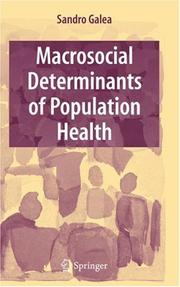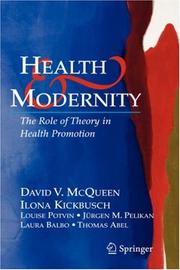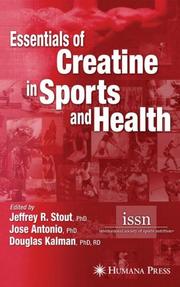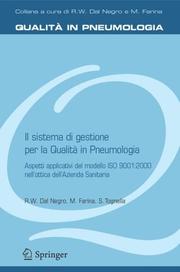| Listing 1 - 10 of 13 | << page >> |
Sort by
|

ISBN: 9780387708119 9780387708126 Year: 2007 Publisher: New York NY Springer New York
Abstract | Keywords | Export | Availability | Bookmark
 Loading...
Loading...Choose an application
- Reference Manager
- EndNote
- RefWorks (Direct export to RefWorks)
Macrosocial Determinants of Population Health explores social factors such as culture, mass media, political systems, and migration that influence population health while systematically considering how we may best study these factors and use our knowledge from this study to guide public health interventions. Starting from the dual premises that a population is not merely the sum of its individuals and that the improvement of population health is not at odds with the practical desire of improving the health of individuals, Sandro Galea and 33 expert contributors present chapters in three sections. The first section includes eleven chapters that each discuss one macrosocial determinant of population health. The factors covered by these chapters encompass a broad range of intellectual concerns, ranging from regulations and legal frameworks (global governance, patent law and policy), to overarching global phenomena (globalization, migration, urbanization, the media), to a specific consideration of the role of economic, political, and corporate policies and practices. The second section considers particular methodologic issues pertinent to those interested in the study of how macrosocial factors influence the health of populations, offering insights on ecological studies and causal inference, and weighing how we may best study the overlapping roles of determinants at local, state, and national levels. The third section presents a framework for interventions that aim to improve population health and innovative case studies that show this framework in action. Throughout, contributors emphasize the potential of population strategies to influence traditional risk factors associated with health and disease. Each section ends with Galea's integrative chapters, bringing the observations and conclusions from the chapters into clear, usable focus. Macrosocial Determinants of Population Health is a work of major theoretical, empirical, and practical interest for disciplines as varied as public health, epidemiology, health promotion, sociology, and health policy. Its systematic field-building approach makes it as valuable to the public health provider as to the scholars and students studying the health of populations.


ISBN: 9780387377599 9780387377575 0387377573 038737759X Year: 2007 Publisher: New York NY Springer New York
Abstract | Keywords | Export | Availability | Bookmark
 Loading...
Loading...Choose an application
- Reference Manager
- EndNote
- RefWorks (Direct export to RefWorks)
Health and Modernity The Role of Theory in Health Promotion David V. McQueen, Centers for Disease Control and Prevention, Atlanta, Georgia Ilona Kickbusch, Federal Office for Health, Bern, Switzerland and Louise Potvin, Université de Montréal, Canada Jürgen Pelikan, University of Vienna, Austria Laura Balbo, University of Ferrara, Italy Thomas Abel, University of Bern, Switzerland Pandemics, substance abuse, natural disasters, obesity, and warfare: the line that once separated health crisis from social crisis no longer exists. Yet while social theories are implied in today's public health arena, they are rarely acknowledged. Now an international panel of leaders in world health explores this vital but understudied aspect of health promotion. Health and Modernity proceeds from the thesis that contemporary health promotion is, by definition, inextricably linked to its social context. The authors discuss global challenges in terms of cultural capital, risk and causality, systems theory, and the dynamic between individual and community. In the process, they define an entity that: -Understands the centrality of health to all areas of human life -Is committed to equity in access to health-promoting resources -Applies a multidisciplinary approach to public concerns -Looks beyond quick fixes and simple answers to complex issues -Employs a variety of political and social agents to accomplish health objectives -Is dedicated to empowerment, facilitation, and inclusiveness The insights found in Health and Modernity are certain to raise the level of debate among professionals, researchers, and the academic community in the global/public health and health promotion fields. This visionary volume guides readers from the immediacy of doing toward the deeper meaning that makes such doing possible.
Hygiene. Public health. Protection --- volksgezondheid --- preventieve gezondheidszorg --- gezondheidspromotie --- gezondheidsbevordering --- Health promotion. --- Social sciences --- Philosophy.
Book
ISBN: 9781441959218 9781441959201 Year: 2010 Publisher: New York : Springer,
Abstract | Keywords | Export | Availability | Bookmark
 Loading...
Loading...Choose an application
- Reference Manager
- EndNote
- RefWorks (Direct export to RefWorks)
Health Assets in a Global Context: Theory, Methods, Action Edited by Antony Morgan, Maggie Davies, and Erio Ziglio As global health inequities continue to widen, policymakers are redoubling their efforts to address them. Yet the effectiveness and quality of these programs vary considerably, sometimes resulting in the reverse of expected outcomes. While local political issues or cultural conflicts may play a part in these situations, an important new book points to a universal factor: the prevailing deficit model of assessing health needs, which puts disadvantaged communities on the defensive while ignoring their potential strengths. The asset model proposed in Health Assets in a Global Context offers a necessary complement to the problem-focused framework by assessing multiple levels of health-promoting aspects in populations, and promoting joint solutions between communities and outside agencies. The book provides not only rationales and methodologies (e.g., measuring resilience and similar elusive qualities) but also concrete examples of asset-based initiatives in use across the world on the individual and community levels, including: ¢ Strengthening the assets of disadvantaged women (Germany). ¢ Sustainable community-based development programs (India). ¢ Using parental assets to control child malaria (West Africa). ¢ Asset/evidence-based health promotion in the schools (Romania). ¢ Evaluating asset-based programs (Latin America). ¢ Using social capital to promote health equity (Australia). Health Assets in a Global Context offers a new, positive lens for viewing the world's most resistant public health crises, making it fundamental reading for researchers and graduate students in public health, especially those involved in health promotion, health disparities, social determinants of health, and global health.
Medicine & Public Health. --- Public Health. --- Health Promotion and Disease Prevention. --- Health Administration. --- Medicine. --- Public health. --- Practice of medicine. --- Médecine --- Santé publique --- Medical care. --- Health promotion. --- Health planning. --- Community health services.
Book
ISBN: 9780335244607 0335244602 9780335244591 0335244599 1283594641 9781283594646 9786613907097 Year: 2012 Publisher: Maidenhead, Berkshire, England ;New York McGraw-Hill Open University Press
Abstract | Keywords | Export | Availability | Bookmark
 Loading...
Loading...Choose an application
- Reference Manager
- EndNote
- RefWorks (Direct export to RefWorks)
This new text is aimed at allied health professionals, nurses and students, helping them to make the links between health promotion theory and practice.
Gezondheidsvoorlichting --- Patiëntenvoorlichting --- Health promotion -- Methods. --- Health promotion. --- Nutrition. --- Health Care Facilities, Manpower, and Services --- Preventive Health Services --- Behavior --- Health Services --- Health Care --- Behavior and Behavior Mechanisms --- Psychiatry and Psychology --- Health Promotion --- Health Behavior --- Public Health --- Health & Biological Sciences --- Public Health - General --- Preventive health services. --- Health promotion programs --- Health promotion services --- Promotion of health --- Wellness programs --- Medical care --- Medicine, Preventive --- Preventive health services --- Health education --- Health behavior. --- Behavior, Health --- Health habits --- Diseases --- Habit --- Health attitudes --- Human behavior --- Medicine and psychology --- Causes and theories of causation
Book
ISSN: 00652598 ISBN: 9789048194858 9789048194841 Year: 2010 Publisher: New York Springer science & Business media
Abstract | Keywords | Export | Availability | Bookmark
 Loading...
Loading...Choose an application
- Reference Manager
- EndNote
- RefWorks (Direct export to RefWorks)
'Rare Diseases Epidemiology' offers numerous approaches to increase the knowledge base of rare diseases and conditions and to facilitate the development and dissemination of interventions for the prevention, diagnosis, or treatment of over 6500 diseases and conditions. The goals of epidemiology are not restricted merely to providing numerical data on the prevalence or incidence of diseases in a limited or general population. Analyses of epidemiological data gathered from appropriately designed and conducted studies are required to establish public health policies and priorities in all nations. Information gained from these studies lead to a better understanding of the etiology and the impact of genetic or environmental factors on the occurrence and outcome of these disorders. The term Rare Diseases includes both acquired and inherited disorders. 'Rare Diseases Epidemiology' provides methods and approaches from the collective experiences of established research investigators who address these significant issues of the development of patient registries; the collection, storage and selected distribution of bio-specimens from bio-banking activities; the validation and utilization of genetic testing and newborn screening procedures; the presentation of issues related to the importance of case reports to increase knowledge of rare diseases; the challenges and models for population-based surveillance studies for rare congenital and inherited disorders; the statistical methods for the geographical analyses of rare diseases; the value and need for clinical trials and comparative effective studies; and meeting the requirements of regulatory agencies. Economic, societal, and ethical concerns are presented as patients and families encounter difficulties obtaining the correct diagnosis, gaining access to treatments, and receiving coverage or reimbursement for approved interventions, and for developing a public understanding of the costs to patients and their families and the burden of illness affecting the quality of life of millions of patients with rare diseases and conditions. Framework programs for rare diseases research as developed by the European Union and the value of national plans for individual member countries are discussed and represent the public commitment to patients with rare diseases. Likewise, similar programs have been implemented in the USA as a result of the Orphan Drug Act to address the needs of the rare diseases community.
Medicine & Public Health. --- Epidemiology. --- Human Genetics. --- Health Promotion and Disease Prevention. --- Medicine. --- Human genetics. --- Médecine --- Génétique humaine --- Epidémiologie --- Rare diseases --- Rare disorders --- Uncommon diseases --- Diseases --- Epidemiology

ISBN: 9781597455732 1588296903 9781588296900 1617377198 9786611136949 1281136948 1597455733 Year: 2008 Publisher: Totowa, NJ : Humana Press : Imprint: Humana,
Abstract | Keywords | Export | Availability | Bookmark
 Loading...
Loading...Choose an application
- Reference Manager
- EndNote
- RefWorks (Direct export to RefWorks)
A great deal of misinformation is present in popular culture regarding the effects of creatine supplementation on health and sports performance. For instance, it is not uncommon for various media outlets to claim, in spite of the lack of supporting evidence, that 'supplementing with creatine is harmful to the liver and kidneys and may cause dehydration and cramping.' In reality, creatine is intimately involved in energy metabolism, performance, and training adaptations, and, recently, several studies have uncovered its potential clinical application toward treating various neuromuscular diseases and maintaining brain function. This book unifies the sum of information on how creatine affects body composition, exercise performance, and health. Because the body of data on creatine is ample and constantly growing, a book such as this is a timely and important resource for the clinician, the coach, and the sports scientist.
Medicine & Public Health. --- Sports Medicine. --- Health Promotion and Disease Prevention. --- Rehabilitation Medicine. --- Medicine. --- Rehabilitation. --- Sports medicine. --- Médecine --- Réadaptation --- Médecine du sport --- Athletes -- Nutrition. --- Athletic Performance. --- Creatine -- Health aspects. --- Creatine -- Physiological effect. --- Creatine -- therapeutic use. --- Dietary Supplements. --- Creatine --- Athletes --- Athletic Performance --- Dietary Supplements --- Food --- Amino Acids --- Guanidines --- Sports --- Food and Beverages --- Recreation --- Amino Acids, Peptides, and Proteins --- Amidines --- Organic Chemicals --- Technology, Industry, Agriculture --- Chemicals and Drugs --- Leisure Activities --- Human Activities --- Anthropology, Education, Sociology and Social Phenomena --- Sports Medicine --- Medicine --- Health & Biological Sciences --- Health aspects --- Physiological effect --- Nutrition --- Nutrition. --- Physiological effect. --- Kreatine --- Health promotion. --- Rehabilitation medicine. --- Amino acids --- Clinical sciences --- Medical profession --- Human biology --- Life sciences --- Medical sciences --- Pathology --- Physicians --- Athletic medicine --- Athletics --- Medicine and sports --- Physical education and training --- Sports sciences --- Medical aspects --- Health Workforce --- Medicine, Rehabilitation --- Rehabilitation medicine --- Rehabilitation --- Medicine, Physical --- Health promotion programs --- Health promotion services --- Promotion of health --- Wellness programs --- Preventive health services --- Health education
Book
ISBN: 9781846289392 1846289386 9781846289385 9786612364723 1282364723 1846289394 Year: 2008 Publisher: London : Springer London : Imprint: Springer,
Abstract | Keywords | Export | Availability | Bookmark
 Loading...
Loading...Choose an application
- Reference Manager
- EndNote
- RefWorks (Direct export to RefWorks)
Sepsis is a multi-factorial disease process and this volume provides comprehensive and in-depth reviews of both the basic science and more practical aspects of patient management. These include detailed information on the epidemiology and genetics of sepsis as well as the metabolic and cardiovascular responses to infection. Infectious disease, in relation to sepsis, is well covered including chapters on unusual/exotic infections, control of infection and the rational use of antibiotics. Haematological aspects of sepsis are also reviewed in detail. Further chapters focus on the currently controversial areas of clinical trial design in sepsis and protocol-driven care. A specific chapter, with illustrated cases, draws practical lessons and offers useful management "tips". The patient with sepsis provides a major challenge to the hospital acute team and septic shock is the commonest cause of admission to General Critical Care Units in the industrialised world. The incidence of sepsis is also increasing, in part due to the more complex patient case mix which is a feature of modern hospital practice. This volume is useful to both trainees in Critical Care and Anaesthesia as well as Infectious Disease and General Medical trainees. It also provides qualified practitioners in these fields with a comprehensive resource on sepsis-related topics.
Medicine & Public Health. --- Infectious Diseases. --- Health Promotion and Disease Prevention. --- Anatomy. --- Dermatology. --- Pneumology/Respiratory System. --- Medicine. --- Human anatomy. --- Emerging infectious diseases. --- Pneumology. --- Médecine --- Anatomie humaine --- Dermatologie --- Maladies infectieuses émergentes --- Bloodborne infections. --- Sepsis. --- Septicemia. --- Septicemia --- Infection --- Systemic Inflammatory Response Syndrome --- Inflammation --- Bacterial Infections and Mycoses --- Pathologic Processes --- Diseases --- Pathological Conditions, Signs and Symptoms --- Sepsis --- Law - Non-U.S. --- Medicine --- Health & Biological Sciences --- Law, Politics & Government --- Infectious Diseases --- Law - Africa, Asia, Pacific & Antarctica --- Blood-borne diseases --- Blood-borne infections --- Bloodborne diseases --- Bloodborne infection --- Blood poisoning --- Poisoning, Blood --- Septicaemia --- Health promotion. --- Infectious diseases. --- Respiratory organs --- Diseases. --- Respiratory diseases --- Health promotion programs --- Health promotion services --- Promotion of health --- Wellness programs --- Preventive health services --- Health education --- Skin --- Anatomy, Human --- Anatomy --- Human biology --- Medical sciences --- Human body --- Clinical sciences --- Medical profession --- Life sciences --- Pathology --- Physicians --- Communicable diseases --- Blood --- Transmission --- Emerging infections --- New infectious diseases --- Re-emerging infectious diseases --- Reemerging infectious diseases --- Health Workforce --- Respiratory organs—Diseases.

ISBN: 9788847004382 8847004373 9788847004375 8847004381 Year: 2006 Publisher: Milano : Springer Milan : Imprint: Springer,
Abstract | Keywords | Export | Availability | Bookmark
 Loading...
Loading...Choose an application
- Reference Manager
- EndNote
- RefWorks (Direct export to RefWorks)
Sono numerosi i fattori che in anni recenti hanno contribuito a enfatizzare la necessità di sistematizzare lo sviluppo dei sistemi Qualità: gli incoraggianti risultati ottenuti dalle prime esperienze pionieristiche, la revisione della norma ISO 9000 secondo il più attuale modello Vision 2000, il crescente impegno delle Direzioni Strategiche, i nuovi indirizzi del Piano Sanitario Nazionale 2003-2005 e dei diversi Piani Socio-Sanitari delle singole Regioni in tema di Qualità. Tutto ciò, se da un lato ha inesorabilmente portato anche nel nostro Paese a un sensibile e capillare incremento della "cultura della Qualità" in tutto il personale operante nel Sistema Sanità, dall’altro ha condotto alla necessità di "rivedere" con occhio critico il processo di applicazione del sistema Qualità presso tutte le Unità Operative, oggi più di ieri spinte a uscire dalla visione di Unità Operativa singola, per inquadrarsi nell’ottica più globale dell’Azienda Sanitaria. L’integrazione del sistema di "gestione per la Qualità" con la valutazione e il miglioramento delle specifiche competenze tecnico-professionali e con il monitoraggio della Qualità nei percorsi diagnostici e terapeutici non è stato e non è impegno di poco conto: non a caso questi sono annoverati fra i punti di forza degli obiettivi strategici del Piano Sanitario Nazionale 2003-2005 ("Garantire e monitorare la Qualità delle cure e delle tecnologie sanitarie"). In questo contesto è sempre più pressante la richiesta di strumenti che consentano al medico specialista di utilizzare al meglio i metodi per l’identificazione, la gestione e la misura dei processi diagnostici, terapeutici e gestionali in Pneumologia, avendo come obiettivo il loro miglioramento continuo nel contesto dell’Azienda Sanitaria. L’obiettivo del presente volume è proprio orientato in tal senso e si propone di fungere da strumento utile per intraprendere in maniera semplice l’approccio e la gestione per processi in Pneumologia, rendendo così più facile ed efficace la comunicazione con le Direzioni Strategiche aziendali.
Medicine & Public Health. --- Pneumology/Respiratory System. --- Health Promotion and Disease Prevention. --- Health Informatics. --- Medicine. --- Medical records --- Pneumology. --- Médecine --- Dossiers médicaux --- Data processing. --- Informatique --- Electronic books. -- local. --- Respiratory organs -- Diseases. --- Health Care Quality, Access, and Evaluation --- Health Services Administration --- Internal Medicine --- Health Care --- Medicine --- Quality of Health Care --- Pulmonary Medicine --- Health Occupations --- Disciplines and Occupations --- Health & Biological Sciences --- Respiratory System Diseases --- Respiratory organs --- Diseases. --- Respiratory diseases --- Health promotion. --- Health informatics. --- EHR systems --- EHR technology --- EHRs (Electronic health records) --- Electronic health records --- Electronic medical records --- EMR systems --- EMRs (Electronic medical records) --- Information storage and retrieval systems --- Clinical sciences --- Medical profession --- Human biology --- Life sciences --- Medical sciences --- Pathology --- Physicians --- Medical care --- Health Workforce --- Respiratory organs—Diseases. --- Clinical informatics --- Health informatics --- Medical information science --- Information science --- Health promotion programs --- Health promotion services --- Promotion of health --- Wellness programs --- Preventive health services --- Health education --- Data processing
Book
ISBN: 9781461436065 1461436060 Year: 2012 Publisher: New York, NY : Springer New York : Imprint: Springer,
Abstract | Keywords | Export | Availability | Bookmark
 Loading...
Loading...Choose an application
- Reference Manager
- EndNote
- RefWorks (Direct export to RefWorks)
The statistics are disturbing: steadily rising numbers of sedentary overweight children and obese teens, and a generation looking at a shorter life expectancy than their parents’. But while it may be obvious that physical fitness benefits both the mind and body, a growing research base is supplying evidence of why this is so, and how these benefits may be reproduced in greater numbers. Physical Activity Across the Lifespan makes a clear, scientific case for exercise, sports, and an active lifestyle in preventing illness and establishing lifetime health habits at both the individual and the population levels. The book focuses on key aspects of physical/mental well-being—weight, mood, and self-regulation—and the role of physical activity in public health and school-based interventions targeting these areas. Contributors review definitional and measurement issues salient to understanding what physical activity is, to analyzing benefits of participation, and to implementing effective interventions. Also addressed are limitations of current research, steps needed to continue building the field, and emerging therapeutic possibilities for activity, such as the role of rough and tumble play in preventing ADHD. Included in the coverage: Physical activity, cognition, and school performance. The influence of social and built environments on physical activity in middle-aged and older adults. Preventing and treating obesity through physical activity. Physical activity in preventing drug use and treating chemical dependence. Antidepressant properties of physical activity. Schools as a foundation for physical activity and an active lifestyle. Physical activity as an adjunct or booster to existing interventions. Physical Activity Across the Lifespan is an innovative text for researchers and practitioners in various disciplines including health promotion/disease prevention, child and school psychology, education, health psychology, and public health, as well as program developers and policymakers in these areas.
Developmental psychology --- Psychology --- Social policy --- Educational psychology --- Educational sciences --- Hygiene. Public health. Protection --- medische psychologie --- preventieve gezondheidszorg --- onderwijspolitiek --- schoolpsychologie --- gezondheidszorg --- gezondheidspromotie --- kinderpsychologie --- ontwikkelingspsychologie --- welzijnsbeleid --- sociaal beleid --- Health promotion. --- Child psychology. --- School psychology. --- Health psychology. --- Medicine. --- Educational policy. --- Education and state. --- Social policy. --- Health Promotion and Disease Prevention. --- Child and School Psychology. --- Health Psychology. --- Medicine/Public Health, general. --- Educational Policy and Politics. --- Social Policy. --- National planning --- State planning --- Economic policy --- Family policy --- Social history --- Education --- Education policy --- Educational policy --- State and education --- Endowment of research --- Health Workforce --- Health psychology --- Health psychology, Clinical --- Psychology, Clinical health --- Psychology, Health --- Salutogenesis --- Clinical psychology --- Medicine and psychology --- Psychology, School --- Psychology, Applied --- Behavior, Child --- Child behavior --- Child study --- Children --- Pediatric psychology --- Child development --- Health promotion programs --- Health promotion services --- Promotion of health --- Wellness programs --- Preventive health services --- Health education --- Government policy
Book
ISBN: 9780323401678 0323401678 Year: 2018 Publisher: St. Louis, Missouri Elsevier
Abstract | Keywords | Export | Availability | Bookmark
 Loading...
Loading...Choose an application
- Reference Manager
- EndNote
- RefWorks (Direct export to RefWorks)
Geriatric Nursing --- Aged --- Aging --- Holistic Nursing --- Health Promotion --- Promotional Items --- Health Campaigns --- Promotion of Health --- Wellness Programs --- Campaign, Health --- Campaigns, Health --- Health Campaign --- Health Promotions --- Item, Promotional --- Items, Promotional --- Program, Wellness --- Programs, Wellness --- Promotion, Health --- Promotional Item --- Promotions, Health --- Wellness Program --- Nursing, Holistic --- Aging, Biological --- Biological Aging --- Senescence --- Elderly --- Nursing, Geriatric --- Geriatric Nursings --- Nursings, Geriatric --- Gerontologie --- Health Education --- Preventive Health Services --- Preventive Medicine --- Mutation Accumulation --- Geriatrics --- Longevity --- Geriatric Nursing. --- Holistic Nursing. --- Health Promotion.
| Listing 1 - 10 of 13 | << page >> |
Sort by
|

 Search
Search Feedback
Feedback About
About Help
Help News
News